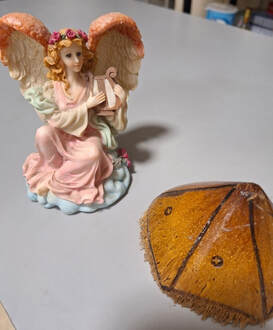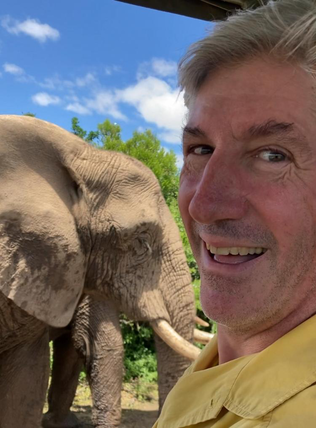|
Christianity-derived-groups often emphasize the importance of individuals believing specific stated ideas or concepts. Many of these groups are made up of individuals who all are convinced, or willing to agree, on the stated ways to God, or heaven, or that make us part of the group in good standing. This may not be a good metaphor, but I often feel there is a box, and all those who agree to get into that box are part of the group and receive its benefits (belonging, sense of community, sense of purpose larger than themselves...).
We Friends have a little of that, but I have always felt that among Friends I am not in a community defined by the box, but by a common amorphous understanding to explore together what it means for the Larger-Than-Us, the Spirit, God, the teachings of Jesus... to be within us. And, to live a life that recognizes everyone/everything beyond me is related to me by virtue of the Larger-Than-Us, the Spirit, God, the teachings of Jesus, also being in everyone else (whether recognized or not, and despite whatever language they speak.) Yes, the Quaker movement came out of a Christian context, and many of us have discovered that Jesus, though he came out of a Jewish context, interpreted his world in ways of wisdom, risk, love, and acknowledgment of the value of people whom the larger culture of his time dismissed as having little worth. People such as poor widows, Samaritans, gentiles, cripples, ... I know many people who have been wounded by other’s use of Jesus and the “Christian” approach to exclude, condem, disdain, judge, or bore them. I also know a good number of these folks feel in their bones that humans have a spiritual, moral, ethical side. And I know many folks whose lives have been utterly changed at learning about Jesus’ message as it speaks to their spiritual, moral, ethical experiences and lives. I love that Quakerism bucks the mainstream, even if we, because it surrounds us, often slip back into wider cultural patterns. It encourages us to not be swayed by false authorities. It suggests people very different from us have elements of the Truth we may not have considered, so listen to them rather than judging them as “not like me.” It offers space for the still, small voice, rather than filling up time and space with words, music, symbolism (not that these don’t have value). Quakerism highlights the ineffectiveness of violence as a means to convince, and insists love is the first motion, working to dismantle the divide between being spiritual in “church” and living what the spiritual means to us "out in the world." As such, might we as Old Chatham Meeting Friends resist cultural tendencies to: -Get into camps -Think that if a way is not right for me, it is wrong -Assume people don’t change over time, or only if they are forced to -Hold a notion that everything has two poles: right/wrong, true/false, male/female, win/lose, mine/yours, good/bad, ... -Blame, shame, and punish rather than seek to understand and heal past traumas, experiences, and reasons for hurtful behaviors Instead can we aspire to treat other humans and non-humans as we would love to be treated: we are on a journey, we come from different experiences, we have special gifts that help us where we are, and we are reminded that love is the first motion? We Friends can start with ourselves in working against a polarized world: let’s continue to talk and share our stories, with joy in the differences, with curiosity about what doesn’t speak to us, with compassion for ourselves and those things that bother us, and with a deep understanding of how biodiversity, geologic-diversity, aquatic-diversity, atmospheric diversity, energetic diversity are central and fundamental characteristics of this earth...not to mention the rest of the universe out there. Below are some thoughts by other Friends on diversity of thought and belief among us: My conviction led me to adhere to the sufficiency of the light within us, resting on truth for authority, not on authority for truth. It is time that Christians were judged more by their likeness to Christ than their notions of Christ. Were this sentiment generally admitted we should not see such tenacious adherence to what men deem the opinions and doctrines of Christ while at the same time in every day practise is exhibited anything but a likeness to Christ.” ~ Lucretia Mott, circa 1850 Love was the first motion, and then a concern arose to spend some time with the Indians, that I might feel and understand their life, and the Spirit they live in, if haply I might receive some instruction from them, or they be in any degree helped forward by my following the leadings of Truth amongst them. And as it pleased the Lord to make way for my going at a time when the troubles of war were increasing and when by reason of much wet weather travelling was more difficult than usual at that season, I looked upon it as a more favourable opportunity to season my mind, and bring me into a nearer sympathy with them. And as mine eye was to the great Father of Mercies, humbly desiring to learn what his will was concerning me, I was made quiet and content. ~ John Woolman, 1763 Can we settle the question, ‘Is the Society of Friends Christian or not?’ In the historical sense the answer is Yes: but that does not preclude the possibility that we may now be called to a new and wider perception of the Truth. We have the witness of the Society itself, as well as the example of Jesus, against turning yesterday’s inspiration into today’s dogma. Today’s world-wide knowledge of people and their religions does present a challenge which our universalists are right to try to meet – just as our Christians are right to remind us that the insights of the past must not lightly be thrown away. It may be valuable to live for a while in the tension between the universal and the specific; and if so, there may be a special vocation here through which our Society (with its tradition of respect for the divine Seed in everyone) can minister to the church at large. Or it may be that a synthesis is possible, once we can agree on what is essential to being a Christian. ~ John Lampen, 1985 From the beginning the Quaker Christian faith has had a universal dimension. George Fox saw the Light ‘shine through all’ and he identified it with the divine Light of Christ that ‘enlightens every man that comes into the world’ (John 1:9). He pointed out, as did William Penn in greater detail, that individuals who had lived before the Christian era or outside Christendom and had no knowledge of the Bible story, had responded to a divine principle within them. In these terms, all Quaker Christians are universalists. Obedience to the Light within, however that may be described, is the real test of faithful living. ~ Alastair Heron, Ralph Hetherington and Joseph Pickvance, 1994 Post by Jens Braun
2 Comments
An Old Chatham Friend recently remarked that structure requires space. What if Good requires Evil? Put theologically, what if God has to struggle against Evil? Many Quakers complain about all their efforts toward peace and justice bringing few or no results. But if God and we as God’s instruments have to fight against Evil, is it not logical that the strength of Evil makes our progress toward the Good slow and arduous. In mythical terms, the angels are confronting the power of the Devil. Perhaps we can be encouraged by the thought that Good will eventually win out if only we persist, if only we don’t lose faith. ~ Richard Russell photo by Richard Russell Martha Braithwaite, a British minister of the nineteenth century, found herself often tried by weakness and dejection while traveling in her youth, after exhilarating times when she felt she was “well used” in ministry. She brought this sense of bereavement into her prayer, and was led to see how the emptiness was actually a time to wait and receive, perhaps in ways she could not identify.
I soon found my mind dipped into fresh baptisms as we rode along. Oh, these ‘ deaths oft,’ how the creaturely part does shrink from passing through them, and yet they are I believe indispensably necessary, nor is it any wonder if vessels in use need more washing and cleansing than those which may be laid up on the shelf. ~ from Brian Drayton’s Midweek Meditations Jan. 11, 2024 https://neym.org/events-calendar/2023/09/midweek-meditations ~ submitted by Richard Russell When I passed into the arrivals hall the place looked like every other airport I’ve seen. It was filled with the characteristic trolley carts of people pushing their luggage around, cabbies holding up signs for the clientele and advertisements everywhere for what to see in the country.
I stopped and took a long look around me trying to find my person, Sharon, in the sea of black faces ahead of me. It should have been easy but I was blind. It reminded me of this experiment I’d read about in my college years where kittens were raised in a cage with only vertical lines. When the kittens were released, they literally could not see anything horizontal. Being a minority for the first time in a place that is predominantly black was disorienting. Like the kittens I had a handicap to deal with. The guy at the taxi stand clearly saw the “deer in the headlights”look on my face and asked me if I needed a ride. I said that I had a ride but that I couldn’t locate her as my phone was not working in this place. “Come with me I’ll give you a hotspot and if can reach your friend — if it works — you can offer me something” It seemed fair enough. In a minute I was on the phone and Sharon came to the cab kiosk I handed the guy a $10 because I didn’t have any small bills and he was delighted. I had just given him R187, enough to buy himself a nice lunch. Sharon shook her head at my naïveté and said “I should be more careful.” Maybe I was to generous but off we went. What I’ve come to learn, is that South Africa is quite a polarized society. There are big gaps between the rich and the poor and everywhere you go in this country people are seeking ways to get by. If you park your car, there’s a parking attendant who will be looking for five Rand. If you use the toilet, there’s a toilet attendant who you are expected to give one or two Rands From the Quaker perspective of equality, this is a very unequal place and yet in spite of race and class this place seems to work; for how long no one knows but my gut sense is that unless the media whip up animosity between people they will continue to find ways of approaching each other’s humanity without violence. From the time the Portuguese landed here on their way to India in 1488 this place has been treated by Europeans as a rest stop where they took whatever they wanted. While locals were not taken for slaves elsewhere they were conscripted as laborers in service first to explorers and later to the chartered companies that would later take over everything. The Dutch East India Company first and then the British. Today the US, China and Russia are falling over each other to gain a foothold in a country so racked by corruption that the highest bidder will take all. When Mandela was elected after apartheid the country was in a five year fever dream of reconciliation and redistribution of wealth to balance what had been stolen, but today a kleptocracy exists inside the ANC to the point that water & sewer doesn’t work, the roads are so full of potholes that 25 k/hr is too fast to drive and the railways and electric grid is literally being stolen wire by wire and rail by rail. Rolling blackouts are managed by a smartphone app from the electric company and passenger & freight rail has been replaced by trucks. In spite of all of this, the place is spectacularly beautiful. And the land seems to quietly resist development 600 years after the first explorers arrived. The place where I’m staying now, the Highlands, after Scottish people who we’re dumped here after the closure of the commons in Britain around 1820, is wild. The Eastern Cape is not that hospitable to farming unless you’re either very lucky or very resilient. Some farmers have managed to eek out a living on sheep, cows, and goats but it’s not like Columbia County where there is rich topsoil and an abundance of water. The red clay is poor quality for planting. Dense scrub, native trees and plenty of invasive species imported from Australia by boats from errant seeds cling to life. Rainfall on average is 250 - 300 mm. /yr. Many houses and farms contain cisterns that hold 5000 - 10,000 liters of water for dry periods. One thing the environment is conducive for here is community- you can’t be the “Marlboro Man” or the “Lone Ranger “ in this place or you’ll fail. There seems to be deep ties of cooperation among the locals. Because the local municipality is so corrupt and incompetent the roads are in very poor condition. They locals have refused to pay the road tax, escrowed the money with a lawyer and used it to hire a company to grade the road. As a Quaker (and a war protester) that kind of cooperation appeals to me. A lawsuit is currently in progress to discover where the tax money goes once in the hands of officialdom. There are no Quakers in the Eastern Cape. The closest meeting seems to be near Cape Town but a deep reverence for nature pervades this place. If there is a God we can surely find it in creation. Life wants to live. Its many forms may come and go but it refuses to die. If there is proof of God, then surely it is life for a strong as the powers of destruction are – – those powers never win. By my estimation, spirituality runs deeply through this place but it requires stillness. One might see a termite mound and not realize below the ground is a hectare of termites, making their living in the soil beneath your feet. They are carrying out their lives following some grand design that we can’t even fathom. Humans are self absorbed by the notion that we are the pinnacle of creation… Nothing could be farther from the truth. If the last 4 billion years of life could be compressed into a single hour. Humans would be 11:59 PM. We carry a certain intelligence within us but we must also remember that we are just one part of a great web of life. The spirituality that I found in this place begins with humility. Humbly finding your place in the landscape, humbly asking your ancestors for guidance, and humbly seeking the small voice of God. The good news is that in a quiet place like a farm where there is no electricity, tv or internet that small voice seems closer. ~ Joseph Olejak |
This blog was set up to post content of interest to Old Chatham Quaker members and attenders. Posts related to one's own personal spiritual journey, reports based on interviews with others, and reflections on Quaker-related topics are welcome. Posts by individuals are personal expressions and do not necessarily reflect those of the Meeting as a whole.
Guidelines for posting on website blog:
Submit to member of Communications committee; committee has editorial oversight over all content posted on the Meeting website. Be respectful of the nature of vocal ministry given in Meeting for Worship or other settings and any private conversations about spiritual matters. Cite source of any image or other external content submitted. Archives
July 2024
Categories |



 RSS Feed
RSS Feed